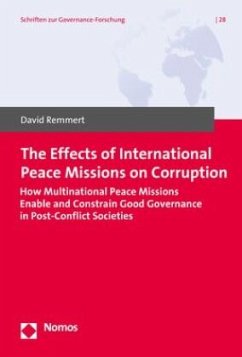International peace missions face a fundamental dilemma between their aims of ending conflict and also fostering good governance. This study presents empirical evidence that more is not better in international peacekeeping: more authority vested in a peace mission yields less effectiveness in curbing corruption.Its author applies a framework that uses the intrusiveness of international peace missions to study their effects on corruption. Bridging the gap between large-N quantitative studies and single case studies, the study pursues a mixed methods design, employing statistical analyses as well as qualitative case studies of Sierra Leone, Côte D'Ivoire, Kosovo and Croatia. The analysis shows that highly intrusive peace missions are more likely to enable corruption than to constrain it. By contrast, missions with medium levels of intrusiveness are more likely to contribute to better control of corruption by acting as impartial arbitrators and by conditioning external assistance.
Bitte wählen Sie Ihr Anliegen aus.
Rechnungen
Retourenschein anfordern
Bestellstatus
Storno

